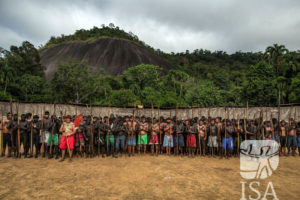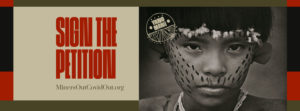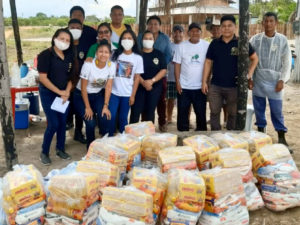Rainforest Foundation US recently visited the Peruvian Amazon department of Madre de Dios in order to research the potential impacts of an oil concession and illegal logging in the area. What we found, however, was gold, and the rapacious devastation of relentless illegal gold mining on indigenous territories.
The vast department of Madre de Dios consists entirely of rainforest and is home to thousands of indigenous people, including the Harakmbut, Ese Eja, and Matsiguenga. Apart from the department capital of Puerto Maldonado, most of the region’s inhabitants are indigenous families who rely exclusively on the resources provided by the forests and rivers to maintain their traditional livelihoods. But for the past few years, Madre de Dios has been experiencing a full-on gold rush. Each day, over 100 people descend from the highlands to seek gold in the department’s rainforest. There are at least 3,000 formal mining concessions in the region; but most of the gold mining is illegal and improvised, meaning that the highly toxic mercury and cyanide tailings are dumped directly into formerly pristine rivers and streams. Moreover, most miners don’t find gold or strike it rich, and supplement their income through illegal logging.
Luis Tayori, President of the Harakmbut, Yine Matsigenka Council (COHARYIMA)—an indigenous organization representing the native peoples of Madre de Dios—has been fighting for the land and resource rights for the Harakmbut indigenous communities for years. He is dedicated to preserving their heritage, which is intrinsically linked to the rainforest. According to Tayori, the situation has never been worse. “The miners not only pollute our water, but also our culture,” said Tayori. “They are just looking to get rich quick and have no interest in conserving the land. When they do find gold, they often drink heavily and look for prostitutes. We worry about the youth in our community.”
Indeed, after we witnessed the environmental carnage caused by gold mining, Luis somberly showed us what was once a lush river basin that had been turned into a desert, so contaminated that there were no surviving fish.
The neighboring ramshackle mining town, known as Delta, is populated by thousands of gold miners. Apart from gold-buying and supply shops, the town is known for run-down brothels and bars. Although most of the people in Delta are gold migrants, Luis is concerned that more and more Harakmbut youth will be drawn to the promise of quick cash, rather than practicing traditional resource use.
Gold is Peru’s highest value export, valuing over 10 billion dollars in 2012, much of which is sent to the United States. Demand for gold remains high, being touted as a safe and stable investment. As long as prices stay well above $1,000 per ounce as they are now, Peruvian prospectors are likely to continue scourging the rivers of Madre de Dios to dig it up. According to prominent Peruvian economist Elmer Cuba, 20 percent of exported Peruvian gold is illegally sourced, and it has overtaken cocaine as Peru’s most profitable illicit activity.




